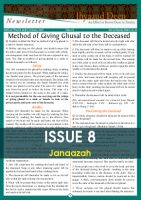1. The mustahab method of carrying the deceased is as follows:
a) One should first lift the front left leg of the bier and place it on his right shoulder and walk for at least ten steps.
b) Thereafter, he should place the back left leg of the bier onto his right shoulder and walk for at least ten steps.
c) Thereafter, he should place the front right leg of the bier onto his left shoulder and walk for at least ten steps.
d) Lastly, he should lift the back right leg onto his left shoulder and walk for at least ten steps.
In this way, one will walk at least forty steps in total whilst carrying the deceased.[1] If this is not possible due to the crowds of people, then one should carry the bier for whatever duration possible.
2. It is sunnah to walk briskly with the janaazah. However, one should not jog or run, or move so fast that the body of the deceased is jostled (begins to move from side to side).[2]
3. It is makrooh for those who accompany the janaazah to sit before the janaazah can be placed onto the ground. However, if there is a valid excuse e.g. sickness or old age, then there is no harm in one sitting.[3]
4. If the janaazah is passing by a group of people, then upon seeing the janaazah, they should not stand up for the janaazah. In the beginning period of Islam, the Sahaabah (radhiyallahu ‘anhum) were commanded to stand whenever a janaazah passed by, but this law was later abrogated.[4]
5. It is mustahab and more rewarding for those who are accompanying the janaazah to walk behind the janaazah. Walking in front of the janaazah is also permissible. However, if everyone walks in front of the janaazah, it will be makrooh.[5]
6. It is mustahab for those accompanying the janaazah to travel to the graveyard on foot. However, if travelling on foot is difficult due to a valid reason e.g. old age, illness or the graveyard being at a distance, then travelling to the graveyard by vehicle will be permissible. If the janaazah is being transported to the graveyard on foot, then those travelling by vehicle should move behind the janaazah. Moving ahead of the janaazah will be makrooh for them.[6]
7. It is makrooh for those accompanying the janaazah to make any dua or zikr in a loud voice. However, they should remain silent and remember Allah Ta’ala in their hearts.[7]
8. While accompanying the janaazah, one should refrain from speaking of worldly affairs as well as laughing and joking.[8]
[1] ثم إن في حمل الجنازة شيئين نفس السنة وكمالها أما نفس السنة فهي أن تأخذ بقوائمها الأربع على طريق التعاقب بأن تحمل من كل جانب عشر خطوات وهذا يتحقق في حق الجمع وأما كمال السنة فلا يتحقق إلا في واحد وهو أن يبدأ الحامل بحمل يمين مقدم الجنازة كذا في التتارخانية فيحمله على عاتقه الأيمن ثم المؤخر الأيمن على عاتقه الأيمن ثم المقدم الأيسر على عاتقه الأيسر ثم المؤخر الأيسر على عاتقه الأيسر هكذا في التبيين (الفتاوى الهندية ١/١٦٢)
[2] (ويعجل به بلا خبب) وهو بمعجمة مفتوحة وموحدتين ضرب من العدو وقيل هو كالرمل وحد التعجيل المسنون أن يسرع به بحيث لا يضطرب الميت على الجنازة للحديث أسرعوا بالجنازة فإن كانت صالحة قربتموها إلى الخير وإن كانت غير ذلك فشر تضعونه عن رقابكم والأفضل أن يعجل بتجهيزه كله من حين يموت ولو مشوا به بالخبب كره لأنه ازدراء بالموت وإضرار بالمتبعين (البحر الرائق ٢/٢٠٦)
[3] قوله (وجلوس قبل وضعها) أي بلا جلوس لمتبعها قبل وضعها لأنه قد تقع الحاجة إلى التعاون والقيام أمكن منه فكان الجلوس قبله مكروها ولأن الجنازة متبوعة وهم أتباع والتبع لا يقعد قبل قعود الأصل قيد بقوله قبل وضعها لأنهم يجلسون إذا وضعت عن أعناق الرجال (البحر الرائق ٢/٢٠٦)
[4] (ولا يقوم من في المصلى لها إذا رآها) قبل وضعها ولا من مرت عليه هو المختار وما ورد فيه منسوخ زيلعي (الدر المختار ٢/٢٣٢)
[5] الأفضل للمشيع للجنازة المشي خلفها ويجوز أمامها إلا أن يتباعد عنها أو يتقدم الكل فيكره ولا يمشي عن يمينها ولا عن شمالها كذا في فتح القدير (الفتاوى الهندية ١/١٦٢)
[6] ولا بأس بالركوب في الجنازة والمشي أفضل ويكره أن يتقدم الجنازة راكبا كذا في فتاوى قاضي خان (الفتاوى الهندية ١/١٦٢)
[7] وعلى متبعي الجنازة الصمت ويكره لهم رفع الصوت بالذكر وقراءة القرآن كذا في شرح الطحاوي فإن أراد أن يذكر الله يذكره في نفسه كذا في فتاوى قاضي خان (الفتاوى الهندية ١/١٦٢)
[8] ويكره رفع الصوت بالذكر والقرآن وعليهم الصمت … وليحذر عما لا فائدة فيه من الكلام فإن هذا وقت ذكر وموعظة فتقبح فيه الغفلة (حاشية الطحطاوي على مراقي الفلاح صـ ٦٠٦)
 Ihyaaud Deen An Effort to Revive Deen in Totality
Ihyaaud Deen An Effort to Revive Deen in Totality

